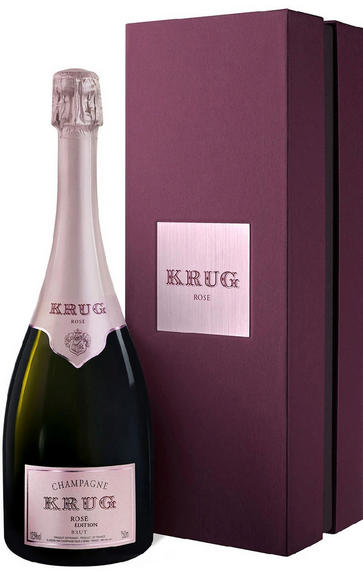
Champagne Krug, Rosé, 20ème Édition, Brut
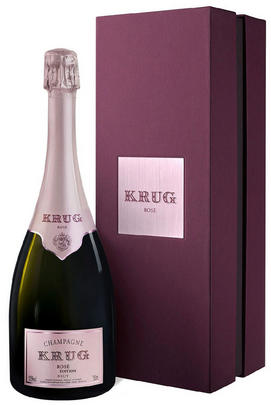
Critics reviews
ID 415066. 66 ingredients in the blend, with wines from five different years back to 2002. Recreated round the 2007 harvest, which constitutes 68% of the blend. 47% Pinot Noir, 37% Chardonnay, 16% Pinot Meunier. There was no Édition number on the label of this wine, made just before it was put there. Most of the red wine grapes came from Aÿ, but also Bouzy and sometimes Mareuil.
Really quite a deep orangey colour. Real evolution on the Pinot-dominated nose. Flattering breadth with a relatively low acid impression. Firm structure. Very long.
Drink 2016 - 2025
Jancis Robinson MW, JancisRobinson.com (June 2022)
Disgorged: Late 2015. Main harvest: 2007. 32% reserves. Aged for more than seven years on lees. 10% red wine.
A distinct coppery colour with amber highlights. Superbly pretty. I noticed this particular bottle has six years of cork-ageing after being disgorged in the winter of 2015. The wine is moving into early mature middle age, showing tantalising complexity now: a touch of toffee, walnut, rich tea biscuit and sweet prunes. There is a silk mousse texture and it is all zipped up with a precise and bracing redcurrant racy finish. Quite a finale, positive freshness which promises more to come.
Drink 2022 - 2030
Tim Hall, Decanter.com (April 2022)
About this WINE
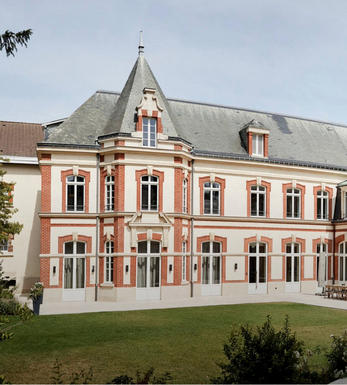
Krug
Krug was established in 1843 and has since specialised in producing only prestige and specialised champagnes. Krug is the only firm still producing all its champagne in small oak casks, an essential element for developing Krug's intense bouquet and complex flavours. Today, Henri, Rémi and Olivier Krug, who supervise every step of production, tasting and blending, represent the 5th and 6th generations.
With long periods of maturation (6-8 years), Krug champagne continues to age gracefully after release, developing an intensely rich, nutty flavour whilst remaining remarkably fresh.
Krug`s finest champagne is Clos du Mesnil, a 100%-Chardonnay based champagne that comes from a small walled vineyard at Le Mesnil-sur-Oger. It is one of the world`s greatest Blanc de Blanc champagnes.
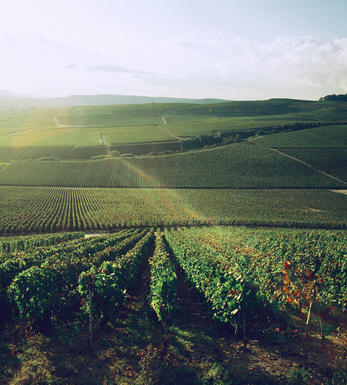
Rosé Champagne
Rosé wines are produced by leaving the juice of red grapes to macerate on their skins for a brief time to extract pigments (natural colourings). However, Rosé Champagne is notable in that it is produced by the addition of a small percentage of red wine – usually Pinot Noir from the village of Bouzy – during blending.
Recommended Producers : Billecart Salmon (Elizabeth Salmon Rose), Ruinart
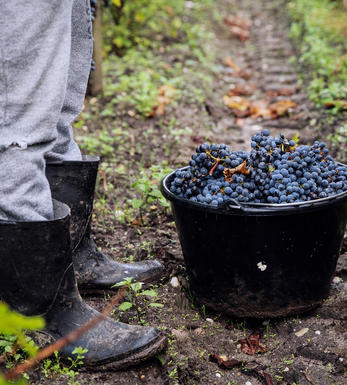
Champagne blend
Which grapes are included in the blend, and their proportion, is one of the key factors determining the style of most Champagnes. Three grapes are used - Pinot Noir, Chardonnay and Pinot Meunier.
26% of vineyards in Champagne are planted with Chardonnay and it performs best on the Côtes des Blancs and on the chalk slopes south of Epernay. It is relatively simple to grow, although it buds early and thus is susceptible to spring frosts. It produces lighter, fresher wines than those from Burgundy and gives finesse, fruit and elegance to the final blend. It is the sole grape in Blancs de Blancs, which are some of the richest long-lived Champagnes produced.
Pinot Noir accounts for nearly 40% of the plantings in Champagne and lies at the heart of most blends - it gives Champagne its body, structure, strength and grip. It is planted across Champagne and particularly so in the southern Aube district.
The final component is Pinot Meunier and this constitutes nearly 35% of the plantings. Its durability and resistance to spring frosts make the Marne Valley, a notorious frost pocket, its natural home. It ripens well in poor years and produces a soft, fruity style of wine that is ideal for blending with the more assertive flavours of Pinot Noir. Producers allege that Pinot Meunier lacks ageing potential, but this does not deter Krug from including around 15% of it in their final blends.


Buying options
Add to wishlist
Description
Disgorged: Late 2015. Main harvest: 2007. 32% reserves. Aged for more than seven years on lees. 10% red wine.
A distinct coppery colour with amber highlights. Superbly pretty. I noticed this particular bottle has six years of cork-ageing after being disgorged in the winter of 2015. The wine is moving into early mature middle age, showing tantalising complexity now: a touch of toffee, walnut, rich tea biscuit and sweet prunes. There is a silk mousse texture and it is all zipped up with a precise and bracing redcurrant racy finish. Quite a finale, positive freshness which promises more to come.
Drink 2022 - 2030
Tim Hall, Decanter.com (April 2022)
wine at a glance
Delivery and quality guarantee